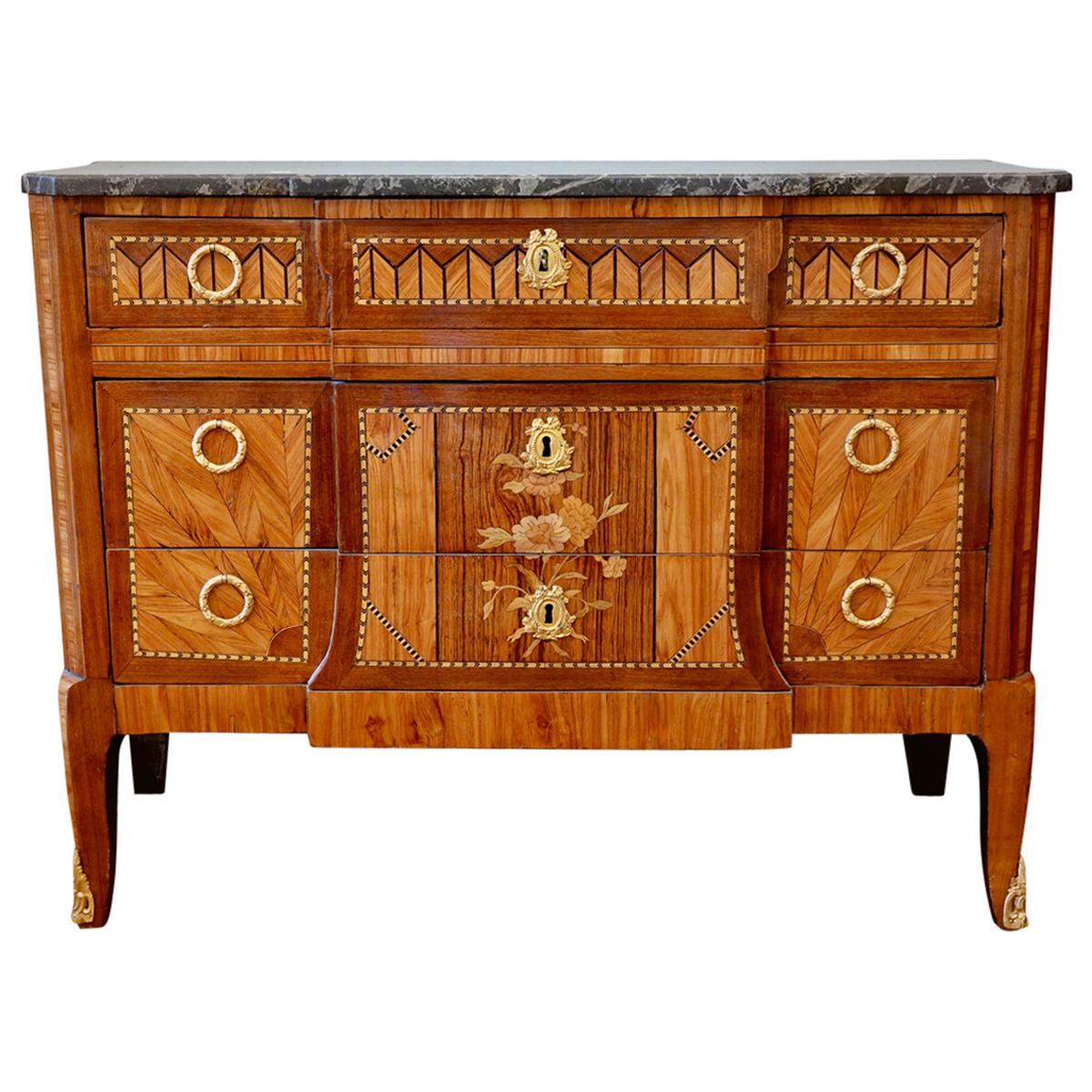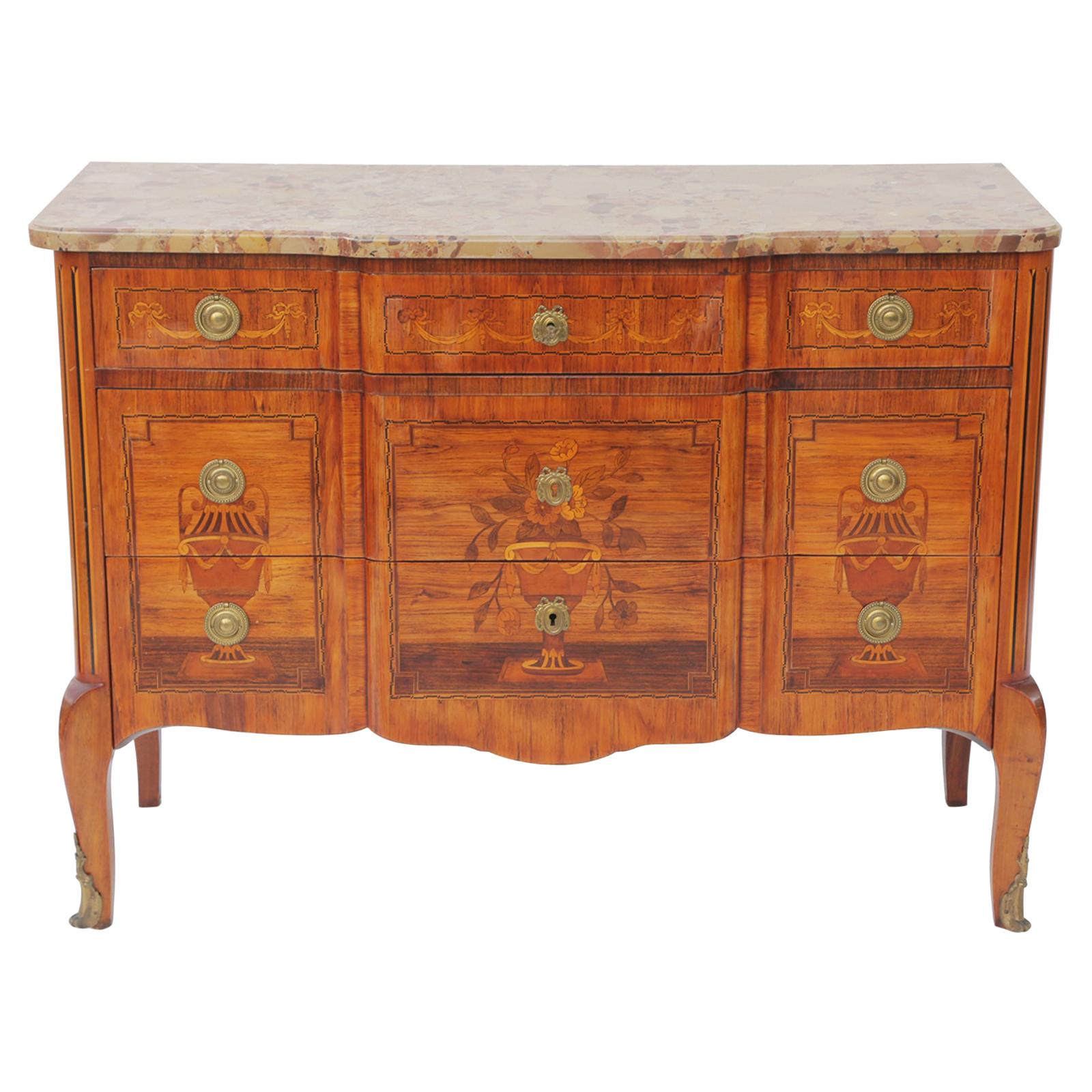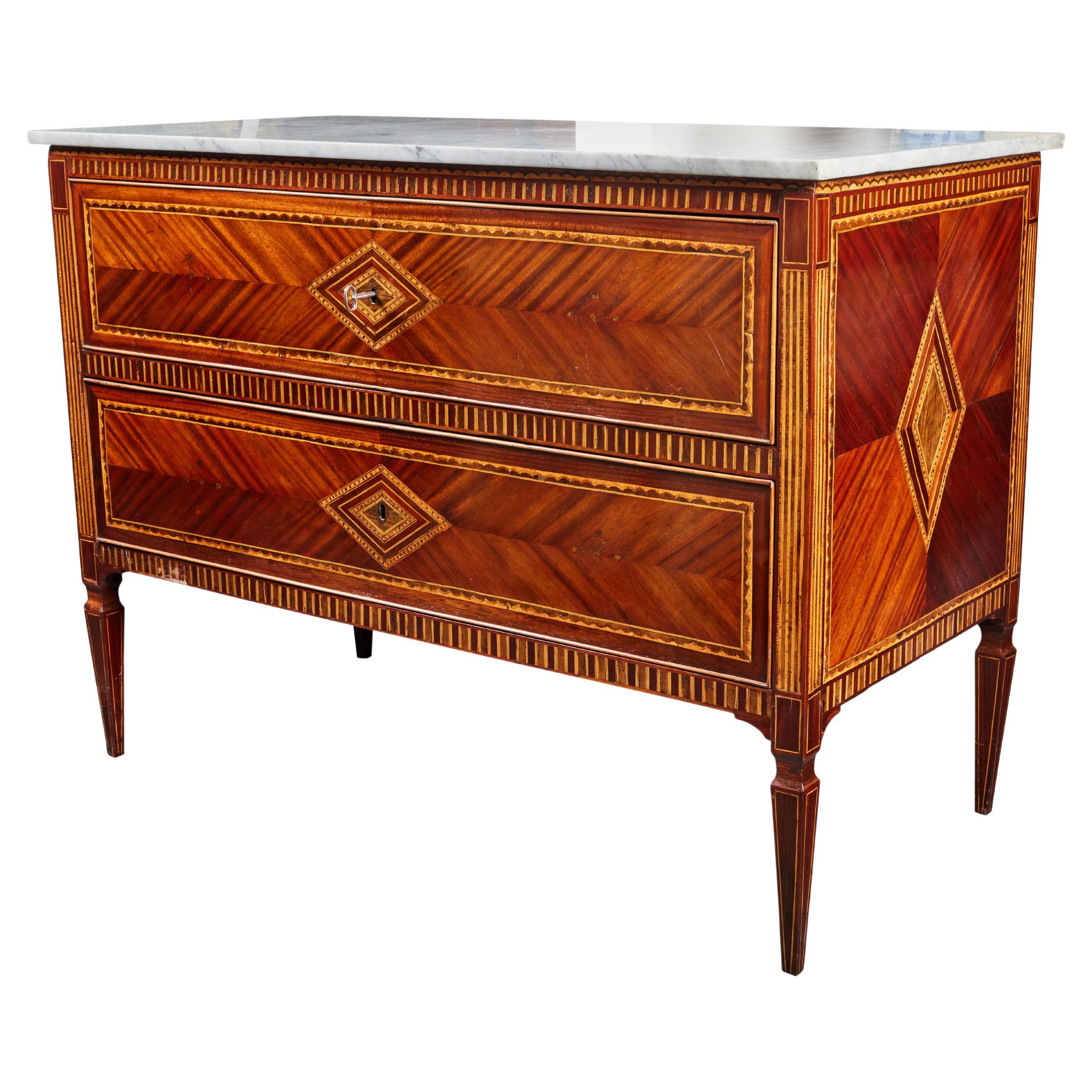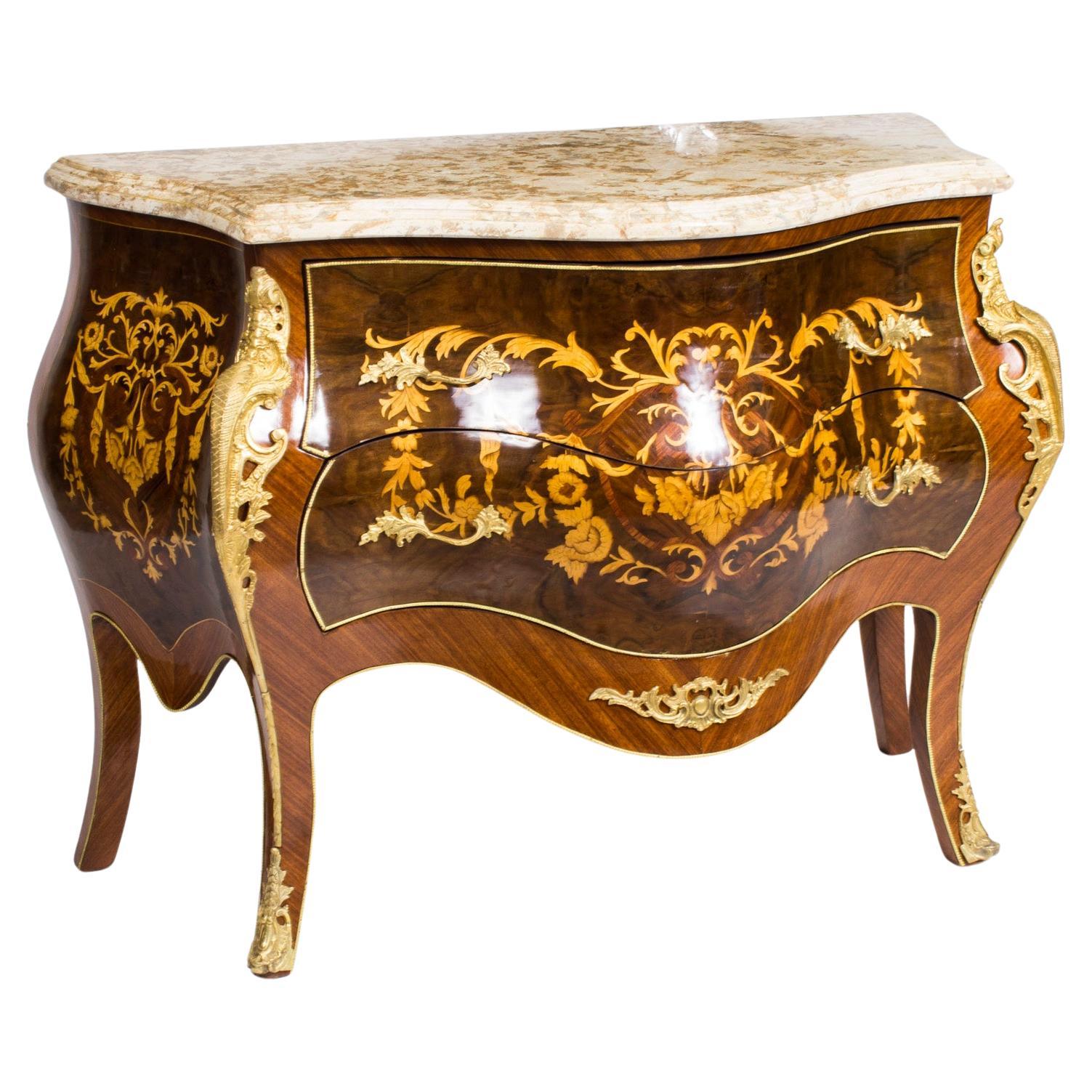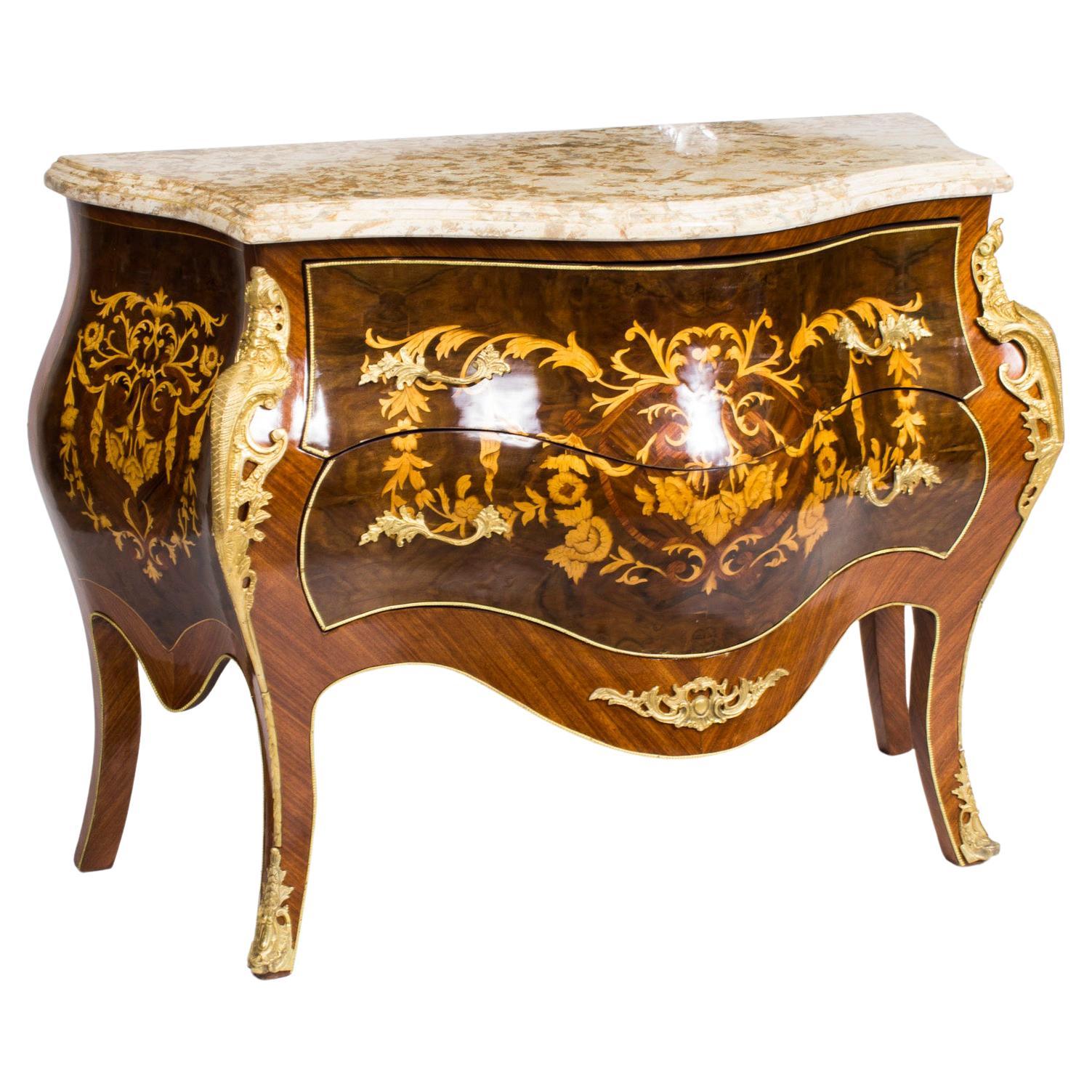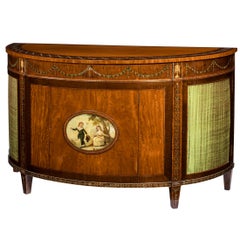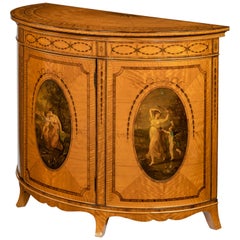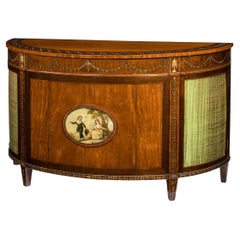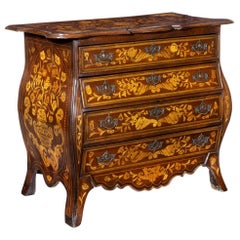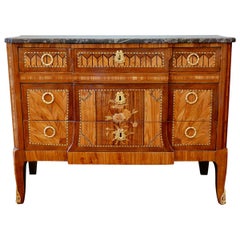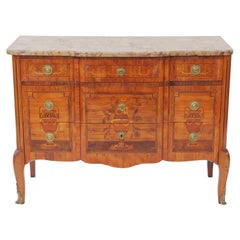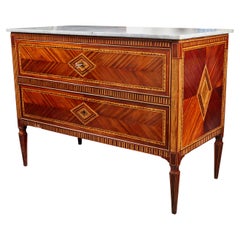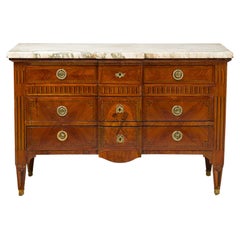Items Similar to Satinwood Sheraton Revival Breakfront Marquetry Commode
Want more images or videos?
Request additional images or videos from the seller
1 of 21
Satinwood Sheraton Revival Breakfront Marquetry Commode
$58,897.58
£42,750
€49,923.71
CA$81,547.82
A$89,030.70
CHF 46,675.15
MX$1,081,312.15
NOK 582,896.69
SEK 550,409.90
DKK 372,627.32
About the Item
An Exceptional Edwardian Satinwood Commode, Reproducing Thomas Chippendale’s Piece-Known as the Diana and Minerva Commode-Supplied to the Lascelles Family at Harewood House
A satinwood Sheraton Revival breakfront marquetry commode, the shaped marble top above one long drawer flanked by two concave drawers decorated with inlaid festoons, all above a recessed, arched central drawer and concave side-cupboard doors, decorated in fruitwood and hardwood marquetry with crossbanding, bellflower garlands and classical motifs centred on roundels depicting Diane and Minerva with mother-pearl and bone detailing, applied with ormolu mounts and raised on six carved square-section legs, the locks on one drawer marked ‘Hobbs & Co’. English, circa 1900.
Ivory reference number: A89CGW1D
Published: Christopher Payne, ‘British Furniture 1820-1920: The Luxury Market.’ Woodbridge, 2023, p. 436, pl. 8.89.
Acknowledged as one of Chippendale’s finest documented pieces, the Diana and Minerva commode was supplied for the State Bedroom at Harewood House in 1773.
Our example faithfully reproduces the spirit and decorative impact of Chippendale’s original-including the wonderful inlaid ivory panels-whilst adding a very practical marble top.
For a very similar commode see the 1900 painting ‘Sir George Sitwell, Lady Ida Sitwell and Family’ by John Singer Sargent. The locksmiths’ company of Hobbs & Co of London was actually founded by an American salesman and inventor for Jones & Newell of New York. Boston born Alfred Charles Hobbs (1812-1891) created quite a stir at the Great Exhibition of 1851 when he picked the ‘impregnable’ locks of both Bramah and Chubb! Making the most of his fame, he registered his own company, Hobbs and Co., in 1852. With various partners, the company continued in Cheapside for the next 90 years, although Hobbs himself returned to the Untied State in 1860.
Harewood House in Yorkshire is one of the Treasure Houses of Britain and one of the finest examples of the harmonious concert of architecture, fine art and decorative arts in the English country house tradition. The house was made for Edwin Lascelles, 1st Baron Harewood, by the admirable triumvirate comprising the architect Robert Adam, the landscape gardener Capability Brown and the furniture maker Thomas Chippendale, each the reigning kings of their respective art forms in the 1760s. One piece by Chippendale set the Baron Harewood back a cool £86 and was invoiced as “A very large rich Commode with exceeding fine Antique Ornaments curiously inlaid with various fine woods […] with Diana and Minerva and their Emblems Curiously inlaid & Engraved”.1 This was the Diana and Minerva commode, one of Chippendale’s greatest works and still on public display in Harewood’s State Bedroom (HHTF:1997.163). Given the iconic status of this commode, firmly attributed to the greatest of English furniture makers during its eighteenth-century ‘golden age’, it is unsurprising that the strongly historicist popular taste at the fin-de-siècle sought to reproduce it in the present lot. In late Victorian and Edwardian interiors, the Arts and Crafts movement had brought a strong current of almost rustic simplicity to much of furniture design, but the admiration for the splendid furniture of the Georgian period remained fervent and was a visible presence in the grand interiors of the period. The quality of the reproduction on the present lot is impressive and an example of the strong calibre of craftsmen that were operating in many art furniture workshops of the late nineteenth century. Beyond the differences in colouring to the veneers, there are some divergences from the design of the original Minerva commode that are observable on this fin-de-siècle copy – the shallower dimensions mean the the side panels are thinner and so the original foliate square is more rectangular, and the typically English marquetry top is replaced with a marble one, more characteristic of French commodes in the period.
- Dimensions:Height: 37.5 in (95.25 cm)Width: 64.5 in (163.83 cm)Depth: 26 in (66.04 cm)
- Style:Sheraton (Of the Period)
- Materials and Techniques:
- Place of Origin:
- Period:1900-1909
- Date of Manufacture:circa 1900
- Condition:Wear consistent with age and use.
- Seller Location:Lymington, GB
- Reference Number:1stDibs: LU973029655912
About the Seller
5.0
Recognized Seller
These prestigious sellers are industry leaders and represent the highest echelon for item quality and design.
Gold Seller
Premium sellers maintaining a 4.3+ rating and 24-hour response times
Established in 1982
1stDibs seller since 2013
135 sales on 1stDibs
Typical response time: 2 hours
Associations
LAPADA - The Association of Arts & Antiques Dealers
- ShippingRetrieving quote...Shipping from: Lymington, United Kingdom
- Return Policy
Authenticity Guarantee
In the unlikely event there’s an issue with an item’s authenticity, contact us within 1 year for a full refund. DetailsMoney-Back Guarantee
If your item is not as described, is damaged in transit, or does not arrive, contact us within 7 days for a full refund. Details24-Hour Cancellation
You have a 24-hour grace period in which to reconsider your purchase, with no questions asked.Vetted Professional Sellers
Our world-class sellers must adhere to strict standards for service and quality, maintaining the integrity of our listings.Price-Match Guarantee
If you find that a seller listed the same item for a lower price elsewhere, we’ll match it.Trusted Global Delivery
Our best-in-class carrier network provides specialized shipping options worldwide, including custom delivery.More From This Seller
View AllSatinwood Antique Demilune Commode
Located in Lymington, Hampshire
Victorian satinwood demilune commode in the Sheraton Revival taste, with a central door showing a painted romantic scene between two panels of pleated...
Category
Antique Late 19th Century English Commodes and Chests of Drawers
Materials
Satinwood
Fine Victorian Sheraton Revival West Indian Satinwood Demilune Commode
Located in Lymington, Hampshire
A fine Victorian Sheraton revival West Indian satinwood demi lune commode, the semi-circular top above three panels, the central one disguising a cupboard door, painted with three ovals in the style of Angelica Kaufman...
Category
Antique 1870s English Commodes and Chests of Drawers
Materials
Satinwood
Satinwood antique demi-lune commode
Located in Lymington, Hampshire
Victorian satinwood demi-lune commode in the Sheraton revival taste, with a central door showing a painted romantic scene between two panels of pleated silk, decorated throughout with delicate bands...
Category
Antique 1870s English Victorian Commodes and Chests of Drawers
Materials
Satinwood, Silk, Boxwood
Period Dutch Mahogany Four-Drawer Bombe Marquetry Commode, 1800
Located in Lymington, Hampshire
A period Dutch mahogany four-drawer bombe marquetry commode, the serpentine shaped top overhanging four graduated drawers, three with bombe front and sides, above a serpentine apron and splayed feet, profusely decorated throughout with variegated boxwood, the top and sides each with an oval panel enclosing a central vase of flowers, cornucopia and scrolls, the drawers with paired cornucopia...
Category
Antique Early 1800s Dutch Commodes and Chests of Drawers
Materials
Mahogany
South German Walnut, Maple and Ebony Banded Serpentine Apprentice's Commode
Located in Lymington, Hampshire
A South German 18th century walnut, maple and ebony banded serpentine Apprentice's commode of small size, with quarter veneering and fruitw...
Category
Antique Late 18th Century German Commodes and Chests of Drawers
Materials
Ebony, Maple, Walnut
18th Century Continental Table Chest of Drawers
Located in Lymington, Hampshire
Unusual 18th century walnut shaped table chest of drawers.
Category
Antique Late 18th Century English Commodes and Chests of Drawers
Materials
Wood
You May Also Like
French 18th Century Transitional Marquetry Commode
Located in Pembroke, MA
French Louis XV-XVI transitional period commode with lovely marquetry in satinwood, rosewood and tulipwood, Gris Sainte Anne marble top and three drawers. The commode features a cent...
Category
Antique Late 18th Century French Louis XVI Commodes and Chests of Drawers
Materials
Marble
Early 19th Century Marquetry Commode
Located in West Palm Beach, FL
Commode, having a top of Breche d'Alep marble, on conforming case, inlaid decoration of festooning and a trio of neoclassical urns; round pulls and escutcheons of gilt bronze, the tr...
Category
Antique Early 19th Century French Louis XVI Commodes and Chests of Drawers
Materials
Breccia Marble
Marquetry Marble Top Commode
Located in Los Angeles, CA
A beautiful walnut and fruitwood veneered 2 drawer commode with marquetry detail. Marble top replaced at a later date. 1 key. From the area of Genoa.
Category
Antique Mid-19th Century Italian Neoclassical Commodes and Chests of Dra...
Materials
Fruitwood, Walnut
$17,500
Louis XVI Marquetry Inlaid Commode
Located in Queens, NY
Louis XVI (18th Century) Marquetry Inlaid Commode with 3 drawers and a white marble top with bronze handles, escutcheons, and sabot feet
Category
Antique 19th Century Unknown Louis XVI Commodes and Chests of Drawers
Materials
Mahogany
Vintage Louis Revival Marquetry Commode Chest 20th Century
Located in London, GB
This is a stunning Louis revival marble topped 'bombe' marquetry commode, dating from the last quarter of the 20th century.
This beautiful commode is made from walnut, wood and fea...
Category
1990s English Commodes and Chests of Drawers
Materials
Marble, Ormolu
Vintage Louis Revival Marquetry Commode Chest 20th Century
Located in London, GB
This is a stunning Louis revival marble topped 'bombe' marquetry commode, dating from the last quarter of the 20th century.
This beautiful commode is made from walnut and features e...
Category
Vintage 1980s Commodes and Chests of Drawers
Materials
Marble, Ormolu
More Ways To Browse
House Of Antique
Marquetry Marble Commode
Victorian Mother Of Pearl Furniture
Mother Of Pearl With Marquetry
English Georgian Chest Of Drawers
Arts And Crafts Chest Of Drawers
1900 French Chest Of Drawers
French Country With Marble Top
Mother Of Pearl Inlaid Cabinet
New England Chest Of Drawers
English Country Chest Of Drawers
Antique Locksmith
Mother Of Pearl Chest Of Drawers
Antique Satinwood Chest
Ivory Inlaid
Antique Sheraton Chest Of Drawers
Mother Of Pearl Inlaid Chest
George 1 Chest Of Drawers
